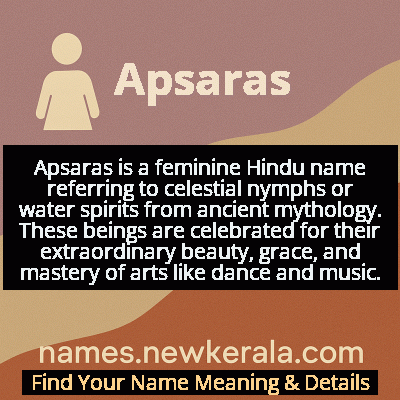Apsaras Name Meaning & Details
Origin, Popularity, Numerology Analysis & Name Meaning of Apsaras
Discover the origin, meaning, and cultural significance of the name APSARAS. Delve into its historical roots and explore the lasting impact it has had on communities and traditions.
Name
Apsaras
Gender
Female
Origin
Hindu
Lucky Number
3
Meaning of the Name - Apsaras
Apsaras is a feminine Hindu name referring to celestial nymphs or water spirits from ancient mythology. These beings are celebrated for their extraordinary beauty, grace, and mastery of arts like dance and music.
Apsaras - Complete Numerology Analysis
Your Numerology Number
Based on Pythagorean Numerology System
Ruling Planet
Jupiter
Positive Nature
Optimistic, inspirational, and creative.
Negative Traits
Scattered, exaggerating.
Lucky Colours
Yellow, gold, purple.
Lucky Days
Thursday.
Lucky Stones
Yellow sapphire.
Harmony Numbers
1, 2, 9.
Best Suited Professions
Arts, writing, communication.
What People Like About You
Creativity, optimism.
Famous People Named Apsaras
Apsara Iyer
Classical Dancer
Renowned Bharatanatyam exponent and choreographer
Apsara Reddy
Journalist and Politician
First transgender person to hold national office in India's Aam Aadmi Party
Apsara Rani
Singer
Popular playback singer in South Indian film industry
Name Variations & International Equivalents
Click on blue names to explore their detailed meanings. Gray names with will be available soon.
Cultural & Historical Significance
Throughout South and Southeast Asian cultures, Apsaras have left an indelible mark on art and architecture. The magnificent temples of Angkor Wat in Cambodia feature thousands of Apsara carvings, each with unique expressions and poses, demonstrating their importance in Khmer culture. In Indian classical dance forms like Bharatanatyam and Odissi, Apsara poses and stories form essential repertoire. The most famous Apsaras - Menaka, Urvashi, Rambha, and Tilottama - appear in major Hindu epics, where their interactions with mortals and gods often drive significant plot developments, highlighting themes of desire, duty, and the interplay between celestial and human realms.
Extended Personality Analysis
Individuals named Apsaras are typically associated with grace, creativity, and an enchanting presence that naturally draws people toward them. They often possess artistic talents and a refined aesthetic sense, with many excelling in dance, music, or visual arts. Their personality is characterized by emotional depth and sensitivity, making them intuitive and empathetic companions. There's an inherent elegance in their demeanor that combines confidence with humility, and they tend to value harmony in their relationships and environments. Their social grace and charm make them excellent communicators who can adapt to various social situations with ease.
However, this name also carries connotations of mystery and elusiveness, suggesting individuals who may be difficult to fully understand or pin down. They often maintain a certain distance even while being socially engaging, creating an aura of intrigue around them. This combination of accessibility and mystery makes them fascinating personalities who can inspire loyalty and admiration. They tend to be idealistic and may struggle when faced with harsh realities, but their inherent resilience and adaptability, much like water, help them navigate life's challenges. Their creative nature often manifests in innovative problem-solving and a unique perspective on the world around them.
Modern Usage & Popularity
In contemporary naming practices, Apsaras remains a distinctive choice that bridges ancient mythology with modern sensibilities. While not commonly found on popular baby name charts, it maintains a steady presence among families seeking names with deep cultural roots and artistic connotations. The name is primarily used within Hindu communities in India and among the Indian diaspora, particularly by parents involved in classical arts or those with strong connections to their cultural heritage. Its usage has seen a slight increase in recent years as part of the broader trend toward reviving traditional and mythological names. However, it remains relatively rare compared to more mainstream Sanskrit names, often chosen by parents who value uniqueness and symbolic meaning over popularity. The name's celestial associations and artistic connections make it particularly appealing to families in creative fields or those wishing to instill a sense of cultural pride and artistic appreciation in their daughters.
Symbolic & Spiritual Meanings
The name Apsaras carries rich symbolic meanings that extend beyond its literal mythological context. Primarily, it represents the embodiment of feminine power expressed through grace, beauty, and artistic mastery rather than physical strength. Symbolically, Apsaras serve as bridges between divine and mortal realms, representing the potential for transcendence and spiritual connection in everyday life. Their association with water symbolizes emotional depth, fluidity, and the ability to adapt while maintaining core identity. The Apsaras also symbolize the transformative power of art and beauty - how creative expression can elevate human experience and connect people to higher consciousness. They represent balanced femininity, combining allure with intelligence, independence with community connection, and earthly presence with celestial aspirations. In a broader sense, the name symbolizes the idea that true power often lies in subtle influence, artistic expression, and emotional intelligence rather than overt dominance or control.

